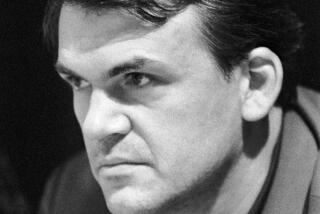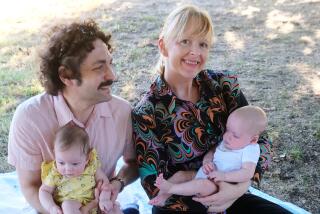Michael Henry Heim dies at 69; UCLA scholar, translator
- Share via
Michael Henry Heim, a literary translator and humble philanthropist whose teaching, activism and widely admired translations of works by such writers as Günter Grass and Milan Kundera helped bring the voices of contemporary world literature into the mainstream of English-speaking cultures, has died. He was 69.
Heim, a professor and former chairman of the department of Slavic languages and literature at UCLA, died of cancer Sept. 29 at his home in Westwood, said his wife, Priscilla.
A polylinguist who translated from about a dozen languages, Heim was “one of the best known and finest translators of the past 50 years,” said Ronald Vroon, chairman of UCLA’s Department of Slavic Languages and Literatures, where Heim taught for 40 years.
FOR THE RECORD:
Michael Henry Heim: A news obituary of UCLA professor and literary translator Michael Henry Heim in the Oct. 8 LATExtra section misspelled composer Bela Bartok’s surname as Bartuk. —
Heim served as Kundera’s translator on “The Unbearable Lightness of Being” (1984), the acclaimed novel about love and politics set in communist-run Czechoslovakia.
He also translated Grass’ novel “My Century” (1999) and his memoir, “Peeling the Onion” (2007), which caused a furor with the Nobel Prize-winning author’s revelation that as a youth he had belonged to the Waffen SS, the Nazi party’s combat force.
Calling Heim’s selection as Grass’ translator “a signal honor,” Vroon said his colleague distinguished himself not only with the breadth and quality of his work but through his efforts to encourage younger scholars to become translators.
He accomplished this in part through a stunning act of charity.
He had inherited a small legacy from his mother that had begun with the death benefit she received after his father died in 1946. Heim and his wife added to the sum every year, managing to save a considerable amount through their frugal lifestyle. Heim in particular hated waste and wore his clothes until they had holes. He was often seen rescuing plastic bottles from UCLA’s trash cans to give to the recycler.
In 2003, he flew to the New York offices of the PEN American Center and told the nonprofit human rights and literary organization he wanted to do something to promote the often neglected work of translation scholars. He and his wife donated their life savings — $734,000 — to establish a fund that has awarded grants to nearly 100 translators over the last decade.
Heim insisted on anonymity because “he did not want anyone to associate him with money. He did not like money at all,” said Esther Allen, a Baruch College professor who chaired the PEN Translation Committee when the Heims made the gift.
Last week Priscilla Heim gave the center permission to identify them as the fund’s benefactors.
The PEN translation grants have led to the publication of works by a varied slate of authors, including Chilean novelist Roberto Bolaño, Iraqi American poet Dunya Mikhail, Iranian novelist Shariar Mandinipour and German writer Jenny Erpenbeck. A number of the translated works have won literary prizes in the U.S. and Canada.
“The grant-giving program has had a real impact on contemporary American letters,” Allen said. “As much as Mike Heim shaped our contemporary literary landscape with his works as a translator … he had a huge impact as an activist.”
Heim approached the complexities of literary translation with humility. “The postmodern stance is that the translator creates a new work. That’s where I disagree,” he told The Times in 2001. “I believe that the translator is a creator, but I’m not so sure that I’d want to create a new work. I would like to create, as much as possible, the same work.
“The reader must believe he or she is reading a work in French or Japanese and yet be reading it in English. That’s the real paradox. It’s a scam, if you like. A feat of legerdemain. But I think it can be done.”
Heim was born in New York City on Jan. 21, 1943. His Hungarian immigrant father was a classically trained musician who studied under Béla Bartok and came to the U.S. in 1939. He died when Heim was 3. Heim’s American-born mother worked as a copy writer and model before she married his father.
His linguistic odyssey began at 13 when he learned French in his New York public school. Then he studied German so he could write letters to his grandmother, who knew German and Hungarian. He learned Spanish as an undergraduate at Columbia University so he could lead campus tours for Spanish-speaking visitors. He learned Russian when he decided to participate in a university-sponsored tour of the Soviet Union.
In later years his repertoire expanded to include Czech, Slovak, Croatian, Serbian, Danish, Norwegian, Swedish, Dutch, Hungarian, Italian, Latin and Romanian. At 60 he resumed the study of Chinese, which he had begun in college.
He graduated from Columbia in 1964 with a degree in Oriental studies and earned a doctorate in Slavic languages and literature from Harvard University in 1971. He joined the UCLA faculty in 1972.
In 1975 he married Priscilla Smith Kerr, a high school Latin teacher. He is also survived by her three children from a previous marriage and seven grandchildren.
In 1973 he made his debut as a translator with “Letters of Anton Chekhov,” which was reissued in 1997. The New York Review of Books called it “still the best work in English on the Russian playwright.”
Grass’ choice of Heim after his longtime translator died placed the UCLA scholar in an elite league. He was one of 15 of the Nobelist’s translators from around the world who were invited to Germany for an intensive three-day seminar with Grass about “My Century.” Later, Heim’s role in crafting the English version of the novel was praised by reviewer John Simon, who wrote in the Washington Post, “Heim’s achievement is prodigious.”
His relationship with Kundera was bumpier. He had produced a successful translation of Kundera’s 1979 novel “The Book of Laughter and Forgetting.” But the Czech writer was so unhappy with what he called Heim’s “translation-adaptation” of his first novel, “The Joke,” that he criticized the translator in the author’s note for a new edition in 1992.
Heim insisted that his name be removed from the 1992 edition, even though, as he said in a 1999 article by Caleb Crain in the journal Lingua Franca, “I stand by the work I did.”
He also was proud that he persuaded Kundera and his American editor to use the literal English translation of the name of Kundera’s most famous novel. The phrase “unbearable lightness of being” was absorbed into the culture and became a popular riff, but Kundera initially had feared its abstract tone would be “a bit hard going” for American readers, according to an interview with Heim recently posted online by the Iowa Review. The author instead proposed using the title of one of the chapters, “Karenin’s Smile.”
“I protested,” Heim said in the interview. “‘We’re not children,’ I told the editor. ‘If “The Unbearable Lightness of Being” is the title, so be it.’ And so it stayed.”
More to Read
Start your day right
Sign up for Essential California for the L.A. Times biggest news, features and recommendations in your inbox six days a week.
You may occasionally receive promotional content from the Los Angeles Times.







